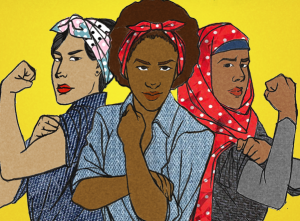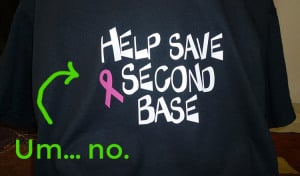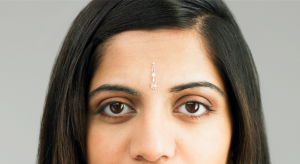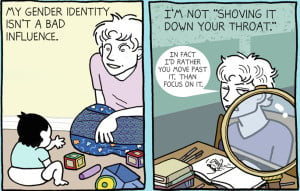Today I’m going to be answering a question from one of my Patreon patrons (which sounds really redundant) about being a person of color who happens to be white-passing.
Before I start this, I want to explain the concept of white-passing. It basically means what it sounds like. It’s when you’re a person of color, whether that be Asian, Native American, black or mixed raced and other people perceive you, either some of the time or all of the time as white.
The question I received is from a person named Susie. She actually has a channel on YouTube which I’m going to link below. She titled her question “Passing Privilege” and she said,
I am half Native Alaskan and half white but since I look mostly white, I am constantly told by strangers, specifically non-Natives, that I am not Native. It’s a weird concept. I know you’ve talked about it before in a video but is it the same with Asian culture? With Native culture you can be extremely cultural but if you don’t have dark skin, you aren’t really ‘Native.'”
As someone who is half Asian and half white, I totally feel you on this. One of the weirdest things I’ve noticed about being on YouTube is that typically in my everyday life, a lot of people read me as Asian or Japanese but then on the internet when I make videos, they assume that I’m white much more often.
Sometimes it’s definitely used in a dismissive way because I talk about race issues a lot. They’ll say, “Oh, you’re really pale. You’re clearly not a person of color,” which is weird because there are a lot of people of color who are light-skinned, particularly, Eastern Asians. Like, a lot of us have pale skins.
I personally am not Native, so I can’t really speak for first hand experience but I do know that a lot of Native American people, particularly mixed race Native people, if they don’t fit into the stereotypical image of a dark-skinned Native American person, then they’re accused of not really being Native.
I feel like this happens with a lot of light-skinned people of color from other races as well. If they have lighter skin or typically white features, then they’re ostracized from both their own communities and from white communities.
I talked about this more in-depth in my “6 Things Not To Say To Mixed Race People” and “I’m Not Normally Into Asian Girls” videos where I discuss being mixed race and feeling like you don’t really belong to any of the races that you’re a part of. I went to a very predominantly white high school, so I was always aware that I was considered a person of color.
Just from the way that people talked to me, I was usually very aware of my race. When I talked to my other white classmates, I definitely felt like my race was hinted at more than it should have been and in a not so positive way. But when I was around other Asian people, I definitely felt like I wasn’t Asian enough either.
It was really confusing because I never knew what category people were putting me in or if they were perceiving me or treating me differently. It was frustrating because I was simultaneously made to feel that I was not white but then too white to be able to talk about it.
When I would talk about racism, I definitely had white friends tell me, “But you’re like, basically white, Marina. You’re just like essentially a white person,” and then the next day, it would be like, “Oh, that guy is into you because you’re Asian and he likes Asian girls.” Like pick one or the other? You can’t have it both ways but I would be white when it was convenient to them and Asian when it wasn’t.
(Oh my God, my foot’s asleep.)
I want to turn this to some other questions that I received on my Tumblr about this because I really like having discussions on there and getting other people’s opinions who might be going through similar things.
An anonymous person said,”Would you say people of color who pass very well have white privilege?” I want to say that I think white-passing privilege is very different from actual white privilege. I think there’s a lot of nuance because there are a lot of people of color or mixed-race people who occasionally will pass as white but it’s very conditional and they never know if they’re getting that privilege or not.
They could be someone who’s white-passing in appearance but they also might have a last name like me which is Watanabe that’s very not-white and just immediately gives away that they’re a person of color. So they might be white passing at first glance but then lose that privilege. So for a lot of people, being white passing is definitely conditional. It changes from situation to situation.
Another person said,
When it comes to any kind of passing privilege, it’s always superficial on top of being conditional. Sometimes being seen as the normalized group doesn’t mean that all of sudden you don’t lack representation, your culture is never made fun of around you, and you didn’t grow up internalizing stereotypes about your identity. White-passing people are still constantly affected by all of these problems whereas white people are not.”
Yep. Just because I occasionally pass as white doesn’t mean that I didn’t grow up hearing all of the negative stereotypes and associations with being Asian. There definitely are a lot of privileges that come from being white-passing, but I don’t think it’s exactly the same thing as having white privilege.
Anyway, thank you, Susie, for coming up with this great question. I’ve actually wanted to talk about this for awhile, so thanks for giving me an excuse to talk about it. If you enjoyed this video, then please give it a like and subscribe to this channel for more videos like this one. Also, this is completely voluntary but if you’d like to help support this channel, then please consider donating to my Patreon, which will be linked below.
https://www.patreon.com/marinashutup?ty=h




















